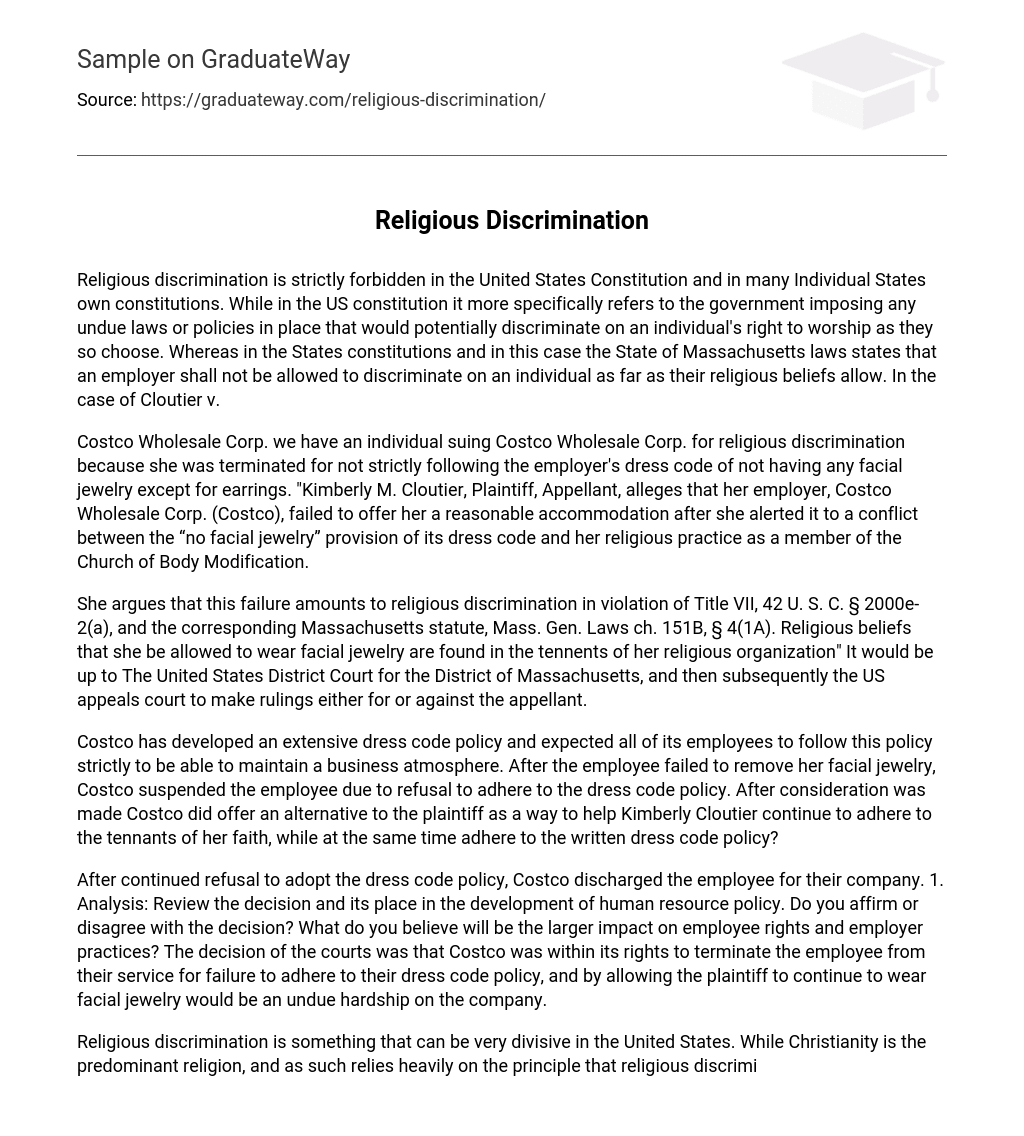The United States Constitution and state constitutions prohibit religious discrimination. The US constitution specifically addresses the government’s implementation of unjust laws or policies that could infringe upon an individual’s right to freely practice their religion. State constitutions, like Massachusetts’, also forbid employers from engaging in religious-based discrimination. This was demonstrated in the Cloutier v. case.
Costco Wholesale Corp. is being sued for religious discrimination after firing an employee who did not comply with their dress code, which prohibits facial jewelry except for earrings. The plaintiff and appellant, Kimberly M. Cloutier, argues that Costco failed to offer a suitable accommodation when she expressed concerns about her religious beliefs as a Church of Body Modification member conflicting with the dress code.
The appellant argues that the failure is a form of religious discrimination under Title VII, 42 U.S.C. § 2000e-2(a), and the corresponding Massachusetts statute, Mass. Gen. Laws ch. 151B, § 4(1A). According to her organization’s religious teachings, she possesses the right to wear facial jewelry. Both the United States District Court for the District of Massachusetts and the US appeals court will make a decision regarding the appeal.
Costco enforces a strict dress code policy to ensure professionalism among employees. When Kimberly Cloutier, an employee, declined to remove facial jewelry, she was suspended by Costco for non-compliance. Nevertheless, after thorough deliberation, Costco found a solution that would honor Cloutier’s religious beliefs while still complying with the dress code policy.
The termination of the employee occurred due to their failure to follow Costco’s dress code policy, leading to debates on the impact it has on human resource policies, employee rights, and employer practices. The court sided with Costco, validating their decision to dismiss the employee for not complying with the dress code. Furthermore, allowing the employee to continue wearing facial jewelry would have placed an unreasonable burden on the company.
Religious discrimination is a contentious topic in the United States, as Christianity, which is the prevailing religion, opposes such discrimination. However, it is crucial to recognize that not all Americans follow this faith; therefore, all religions are safeguarded against discrimination. The main issue revolves around determining what constitutes a religion. Fortunately, in this particular case, the courts did not have to determine whether or not the Church of Body Modification fulfilled the criteria for being a legitimate religious organization.
I believe that the case’s significant aspect is Coulter’s religious discrimination lawsuit against Costco. Nevertheless, the courts determined that the potential hardship on Costco outweighed the religious discrimination claim. I think this directly impacts human resource policies because companies now have a legal document stating that hardship is not solely determined by financial costs, but rather other factors are involved as well. Consequently, human resource departments must consider what qualifies as a hardship for the company when developing policies that may impact an individual’s religious beliefs.
The text addresses the employer’s right to set policies for accommodating different religious organizations. I believe that companies can demand employees to maintain a professional appearance according to the company’s standards. However, policies may differ among companies based on job requirements. Nevertheless, I have some questions about this ruling.
The ruling in consideration suggests the importance of professional appearance for customer-facing employees and the need to avoid offending customers. It is crucial for companies to make reasonable accommodations if facial jewelry makes customers uncomfortable or reconsider doing business. Mere lack of customer complaints does not imply agreement with the employee’s appearance; it is essential to be cautious with silent customers, whereas vocal customers often remain loyal. Furthermore, if a company’s dress code contradicts one’s religious beliefs, it seems illogical to pursue employment there. For example, a bar/restaurant mandates skimpy attire for employees, which may clash with certain religious values. In such cases, alternative job opportunities aligning with personal beliefs can be sought. Nonetheless, this ruling raises concerns that require further thought.
Upon reviewing the case, I noticed certain troubling aspects that have caused me to reconsider my stance. Initially, Costco did not include facial jewelry in their dress code until after employees began wearing eyebrow piercings and similar items. This suggests that management did not approve of a specific appearance and amended the policy accordingly. While the company certainly has the prerogative to adjust its policies as it deems necessary, it is worth noting that employees were permitted to wear their facial jewelry before and even after the policy was implemented.
I believe it is important to consistently enforce company policies in order to prevent any appearance of discrimination. It is noteworthy that Costco had other employees with similar facial jewelry, which emphasizes the importance of this requirement. Costco claims that they did not permit such jewelry, but their large workforce should have made it possible to efficiently monitor and address such violations. I strongly disagree with this justification, as each department should have supervisors and managers responsible for enforcing company policies. This situation highlights the necessity for all levels of management to rigorously enforce these policies.





